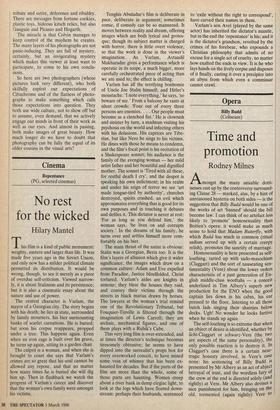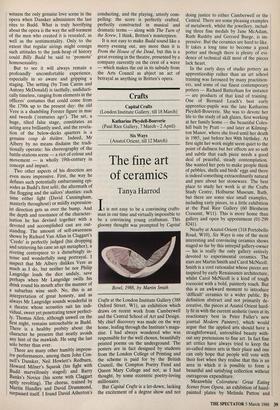Opera Billy Budd (Coliseum)
Time and promotion
Rodney Milnes
Amongst the many amiable dotti- nesses cast up by the controversy surround- ing Clause 28 — marked, alas, by a hint of unreasoned hysteria on both sides — is the suggestion that Billy Budd would be one of the works of art 'banned' should the bill become law. I can think of no artefact less likely to 'promote' homosexuality than Britten's opera: it would make as much sense to hold that Madam Butterfly, with which Budd has much in common (ritual sadism served up with a certain creepy relish), promotes the sanctity of marriage.
Homosexuality is here presented as self- loathing, tarted up with sado-masochism (Claggart) and the sort of nauseating sen- timentality (Vere) about the lower orders characteristic of a past generation of En- glish middle-class wooftahs — a conceit underlined in Tim Albery's superb new production for the ENO when the good captain lies down in his cabin, his ear pressed to the floor, listening to all those butch lads singing their shanties below decks. Ugh! No wonder he looks furtive when he stands up again.
The self-loathing is so extreme that when an object of desire is identified, whether by Licht-Claggart or schwarz-Vere (the two are aspects of the same personality), the only possible reaction is to destroy it. In Claggart's case there is a certain near- tragic honesty involved, in Vere's case none: his sentencing of Billy Budd is presented by Mr Albery as an act of abject betrayal of trust, and the wordless fury of the crew at the end is directed solely (and rightly) at Vere. Mr Albery also devises a nice punishment for him, bringing on the old, tormented (again rightly) Vere to witness the only genuine love scene in the opera when Dansker administers the last rites to Budd. What is truly horrifying about the opera is the way the self-torment of the men who created it is revealed, as well as the sentimentality. Only to the extent that regular airings might consign such attitudes to the junk-heap of history could Billy Budd be said to 'promote' homosexuality.
But to see it will always remain a profoundly uncomfortable experience, especially in so aware and gripping a staging. The setting (by Tom Cairns and Antony McDonald) is tactfully, undidacti cally timeless, ranging from elements in the officers' costumes that could come from the 1790s up to the present day: the old Vere is a shambling Forster figure in mac and tweeds (`centuries ago'). The set, a huge, tilted false stage, constitutes an acting area brilliantly used, and the revela- tion of the below-decks quarters is a genuine coup de thecitre. Indeed, Mr Albery by no means disdains the tradi- tionally operatic: his choreography of the battle-stations scene — a riot of colour and movement — is wholly 19th-century in concept and impact. Two other aspects of his direction are even more impressive. First, the way he defuses such potentially embarrassing epi- sodes as Budd's first sold, the aftermath of the flogging and the sailors' shanties: each time either light (David Cunningham, masterly throughout) or mildly expression- ist direction gets us over the bump. And the depth and resonance of the character- isation he has devised together with a devoted and accomplished cast are out- standing. The amount of self-awareness shown by Richard Van Allan in Claggart's `Credo' is perfectly judged (his dropping and retrieving his cane an apt metaphor), a riveting centrepiece to a disturbingly in- tense and wonderfully sung portrayal. I suspect that Mr Albery dislikes Vere as much as I do, but neither he nor Philip Langridge loads the dice unduly, save perhaps when Mr Langridge swills his drink round his mouth after the manner of a suburban wine snob. No, this is an interpretation of great honesty, and as always Mr Langridge sounds wonderful in a theatre whose acoustics suit his indi- vidual, sweet yet penetrating tenor perfect- ly. Thomas Allen, although unwell on the first night, remains untouchable as Budd. There is a healthy probity about the character he presents that neatly avoids any hint of the mawkish. He sang the last solo better than ever.
There are many other humbly impress- ive performances, among them John Con- nell's Dansker, Neil Howlett's Redburn, Howard Milner's Squeak (his fight with Budd marvellously staged) and Barry Banks's Novice (his scene with Claggart aptly revolting). The chorus, trained by Martin Handley and David Drummond, surpassed itself. I found David Atherton's conducting, and the playing, utterly com- pelling: the score is perfectly crafted, perfectly constructed in musical and dramati terms — along with The Turn of the Screw, I think, Britten's masterpiece.
It is not easy to make Budd sound like a merry evening out, any more than it is From the House of the Dead, but this is a great evening in the theatre, presented by a company currently on the crest of a wave — which makes the cut in its subsidy from the Arts Council as abject an act of betrayal as anything in Britten's opera.



















































 Previous page
Previous page